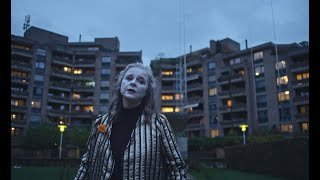
Brunaupark
After you are suddenly faced with the immediate and violent threat of losing your home, where do you go? This question sticks in the mind after watching Felix Hergert and Dominik Zietlow’s “Brunaupark.” It is not a question that people from this district of Zurich ever thought they would have to ask themselves. However, those living in these buildings do not take eviction threats lying down. What is immediately apparent is that these flats are all in good condition many having recently been renovated. So why knock them down? Why bother renovating them in the first place?
The film does not shy away from or soften the blow of naming the root of this massive redesign as capitalist greed. And this greed works by its own arbitrary logic, utterly indifferent to consequences. How many families will have to start again from scratch; what it means, financially and emotionally, for a company to fold these must be figures the owner considered before making such a drastic decision.
In one scene, one of the men points out that the new flats are much smaller but with higher rent. Even the supposed flashy bit of greenery indicated in the blueprint also strikes as starkly inorganic when held up against the lush verdures currently circling these buildings. All of which will be razed to make way for high rises that cram as many tiny flats as possible into one area. Suddenly shops that have been there thirty years are told they need to move out.
That they will have to change their whole trade and life; lose established relationships with customers who live round here it’s a thought that doesn’t bear thinking about further than this film goes.
But then comes a letter from the owner Credit Suisse pension company which even purports to provide them with a recommendation for finding new housing. It couldn’t be more absurdly self-contradictory if it tried! Several times over this film we hear people talking about how hard it is to find new housing in Zurich. An old woman’s perspective is aptly elevated here too she keeps saying she doesn’t know where she’ll end up, aware of the skyrocketing rates of new apartments in Zurich.
How could any ordinary person afford that rent? That things can get so bad that she would have to sleep under a bridge this is a possibility which she genuinely entertains and ruminates on. She makes a wry suggestion that if Zurich can’t get its housing act together then it should build more bridges to house the rising numbers of homeless people.
Residents also mourn the loss of a past sense of community. They say that the new swanky cafeteria is soulless they miss the warmth and closeness which used to keep them together. Apart from these urgent community meetings, we see each of these residents captured within their own separate, individual bubbles. Often the bright orange elevator is the only shared space but words are rarely exchanged there either.
Nevertheless, the extreme and increasingly higher degrees of stress among the inhabitants that is handed to them as they confront a radically uncertain future does not seem to be urgent enough; also, their resolution to fight against eviction with all their collective might seems not to register either. Thus, even though a footnote may tellingly pop up at the end informing us that they have managed to hold on until now, it fails to evoke any such feeling in us.
“Brunaupark” could have been deliberately coolly unsentimental but this was not helpful for watching the movie because it made strange indeed what should have been familiar between people who are being shown onscreen and those watching them. Another way that this film limits itself is by failing to follow through with many questions and fears that permeate its storyline which leaves one wondering why somebody would take away what could have given an otherwise dull story some edge.
Watch Brunaupark For Free On Gomovies.
.jpg?w=1024&resize=1024,1024&ssl=1)
.jpg?w=1024&resize=1024,1024&ssl=1)
.jpg?w=1024&resize=1024,1024&ssl=1)
.jpg?w=1024&resize=1024,1024&ssl=1)
.webp?w=1024&resize=1024,1024&ssl=1)
.jpg?w=1024&resize=1024,1024&ssl=1)
.jpg?w=1024&resize=1024,1024&ssl=1)
.jpg?w=1024&resize=1024,1024&ssl=1)